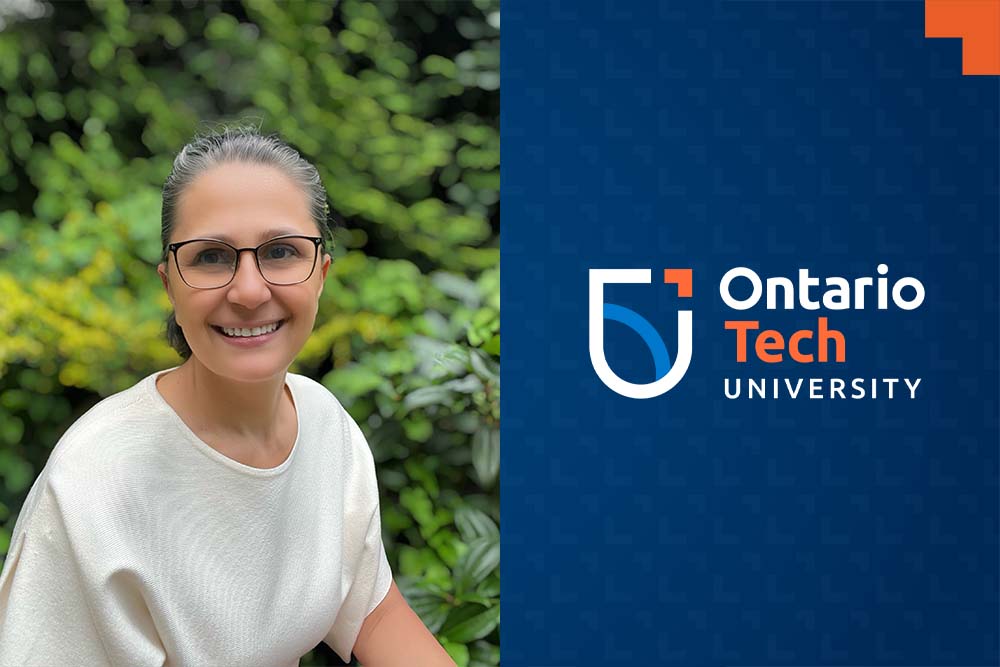Ontario Tech University doctoral student Aneta Stolba of North Vancouver, B.C. is a shining example of how to find success in a changing post-secondary educational landscape.
Stolba is in the third year of her Doctor of Education (EdD) degree at Ontario Tech, a program launched in 2022 by the Mitch and Leslie Frazer Faculty of Education focusing on specific aspects of the use of technology in education, including digital practice. As part of the doctoral program’s inaugural cohort, she is working from the west coast on what will be her third degree from Ontario Tech, having previously earned a Bachelor of Arts (BA) and Master of Education (MEd) at the university.
Stolba’s research centres on identifying themes, perspectives and support mechanisms related to the portrayal of autism on Canadian organizational websites, to create a more nurturing environment for individuals with autism and their support systems.
“My research focus on autism is driven by both personal experience and professional motivation,” says Stolba, who was born in Bulgaria and later lived, studied and worked in Austria. “With my background in education, I initially worked as a kindergarten teacher. However, after immigrating to Canada, the available employment opportunities didn’t align with my previous education. When a family member was later diagnosed with autism, the experience was transformative for both myself and my family, leading me to seek a better understanding of it, and of the environmental factors that shape how it is experienced. It became a journey of self-discovery, helping me redefine myself as an individual, a parent, and an autism support professional – now seen through the lens of neurodiversity.”
Stolba’s research recently earned major recognition from the Council of Ontario Universities (COU), in the form of an Autism Scholars Award. Her prize was one of just five presented by the COU to a doctoral or master’s-level researcher at an Ontario university for research that will positively impact individuals with autism and their families.
“The COU recognition through the Autism Scholars Award is deeply meaningful to me,” says Stolba. “It not only signifies growing support for autism research, but also validates the importance of my specific focus within this field. This award inspires me to continue with even greater commitment, knowing the research contributes to a deeper understanding of autism, and supports ongoing efforts to improve resources and awareness for autistic individuals.”
Ontario Tech’s online programs offer the flexibility to integrate studies with family and professional life
When exploring her future educational options in Canada, the first-generation immigrant and working mother of four says Ontario Tech quickly emerged as a leading option.
“The university’s flexibility and the accessibility of online learning were critical in allowing me to balance my professional and educational development,” Stolba explains. “Ontario Tech was highly supportive of my research interests, allowing me to explore personally and academically meaningful topics. It was the perfect situation for pursuing my BA and MEd.”
And suddenly in 2022 came the opportunity to pursue a doctoral degree.
“When I learned about the launch of the EdD program, I was excited to remain part of Ontario Tech’s innovative approach to technology-in-education and be mentored by renowned researchers like doctoral supervisor Dr. Robin Kay and co-supervisors Dr. Allyson Eamer and Dr. Bill Hunter.”
Although Stolba lives more than 4,000 kilometres from campus, she still feels a profound sense of community and connection with her peers and professors at Ontario Tech.
“Despite only visiting the campus once for my MEd graduation ceremony in 2022, I have formed lifelong friendships and maintained strong ties with the university community. These relationships continue to be an integral part of my professional network and personal life.”
Research connectivity through three Ontario Tech degrees
Stolba’s undergraduate project, supervised by Dr. Roland vanOostveen and entitled ‘Increasing Employer Capacity for Hiring and Retaining People with Disability’, laid the groundwork for continued research in the field of autism and disability studies. Her master’s degree work focused on the intersection of online affordances, autism, and social engagement. Her doctoral research continues to explore the online space, particularly how it relates to autism awareness and acceptance, investigating how Canadian autism organizations engage in online autism discourse.
“This research is significant because it highlights the role of these organizations as key influencers in shaping public understanding of autism. I hope that my research will offer valuable insights to inform organizations—and society at large—to enhance online resources and autism support systems, whether in B.C., Ontario or across the country.”
About autism awareness in Canada
The Canadian Academy of Health Sciences says approximately one in 50 Canadians is diagnosed with autism, translating to about 800,000 autistic individuals nationwide. Public awareness has grown in recent years, partly driven by greater access to information and increasing self-advocacy within the autistic community.
“Despite this increased awareness, research indicates that stereotypes about autism persist, and current support systems often fail to address the diverse needs of autistic individuals and their families and caregivers, particularly those of autistic adults and women,” says Stolba. “Autistic individuals also experience some of the lowest workforce participation rates among all disabilities. These complexities underscore the urgent need for a more nuanced understanding, and tailored support systems.”

